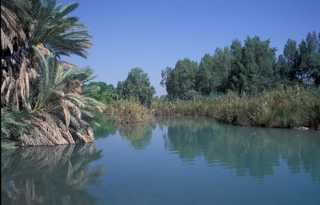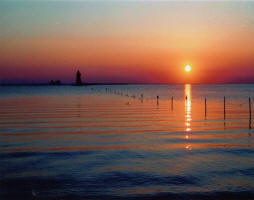 Concept and Vision Note
Concept and Vision Note
| Released | 10/04/2006 |
|---|
(v. 28 March 2005)
1. Introduction
The Mediterranean, a water scarce area, lies on the cross road of three continents and it has been the cradle of major civilizations. The shared century-old experiences and diverse cultures have resulted to uneven levels of economic development and socio-political systems. The region is encountering a rapid, unbalanced demographic growth and increased urbanization trends, mainly in the coastal areas. At the same time, the Mediterranean region is rich in unique and fragile ecosystems.
Water supply in the region is unequally distributed in space and time, both at regional level and within each country. The Southern Mediterranean and Middle East sub-regions have among the lowest per capita amount of water supply in the world. It is estimated that 7% of the entire Mediterranean population (28 million persons) lie below the poverty line of 500 m3/year per capita and another 29% (115 million persons) are below the threshold of 1000 m3/year per capita. In certain countries, exploitation indexes of renewable natural fresh water resources have reached 100%. The intensive extraction and use of water for domestic, agricultural and industrial purposes, without proper provisions for the protection of the resource, has led to serious water pollution of surface and ground water bodies. Agriculture consumes 70-80% of water in the Mediterranean countries. Many countries in the region are currently in a stage of institutional reform, orienting priorities and practices towards an integrated water resources management (IWRM) approach.
Major investment on water infrastructure in the Mediterranean countries has been made through bilateral and multilateral agreements. The EU Member States and the Commission are among the major donors in the region, including support to water sector, constituting a major force towards economic growth and transition.
In particular, some of the key challenges in the water sector in the Mediterranean could be identified under the following broad categories:
- water scarcity
- lack of accessibility to water supply and sanitation
- water pollution and environmental degradation
- management of shared waters
- food availability, stability, accessibility and affordability
- awareness of decision makers and the public
- decline of financial resources allocation
- skilled and motivated water professionals
- institutional aspects and fragmentation of water management
- sustainable management of non-renewable groundwater resources
2. Background
Improved access to water supply and sanitation can make a major contribution to poverty eradication, health, quality of life and protection of the environment. Therefore, progress towards the targets on water supply and sanitation agreed in Johannesburg should be a first priority and an integral part of Poverty Reduction Strategy Papers (PRSPs) and National Strategies for Sustainable Development (NSSDs). Integrated Water Resources Management (IWRM) with strong stakeholder participation and a gender and pro-poor perspective is also a key instrument to ensure a development which is balanced, by integrating water considerations in other sectoral policies.
To respond to these challenges, the EU Water Initiative was launched in Johannesburg, in 2002, as a key contribution to the implementation of the World Summit on Sustainable Development (WSSD) targets and Plan of Implementation and to assist achievement of the water-related Millennium Development Goals, providing a platform for strategic partnerships.
In particularly, concerning the Mediterranean, Water has always been a priority theme in the region which is indeed a highly water scarce area. However, water has also been an agent for close cooperation between Mediterranean countries that have a long tradition in developing cooperation and networking schemes, many of which address issues of sustainable development, environmental protection and management of natural resources. Water is a defined priority in the majority of related regional processes eg. Euro-Mediterranean Partnership, Barcelona Convention, MCSD etc.
Among recent major plans of action and recommendations we should make reference to:
- Euro-Mediterranean Plan of Action on Integrated Local Water Management, Turin, 1999.
- Recommendations on Water Demand Management of the Mediterranean Commission for Sustainable Development (Frejus and Fiuggi outcomes), 1997 and 2002.
- 'Vision to Action Process' for Water in the Mediterranean (Vision, Framework for Action, Core for Action Plan) of GWP-Med, 1999-2001.
It should be noted that the aforementioned action plans have been developed before WSSD and there is an emerging need for proper adaptation of their orientation according to decisions taken and targets agreed in Johannesburg. In this context, the Mediterranean Strategy for Sustainable Development which is currently under preparation will provide a coherent framework for pursuing concerted activities, in the region, aiming at its viable, sustainable and balanced development, taking into account, inter alia, recent international commitments and goals.
In this context, Greece, which has traditionally strong linkages, social, cultural and economic, with South East European countries and countries bordered by the Mediterranean and SE Europe, has undertaken a leading role in promoting the European Union's Water Initiative in the sensitive areas of the Balkans and the Mediterranean, since Johannesburg, in 2002, seeking to make significant progress in poverty eradication and promoting a catalyst for peace and security in the region, a region with many transboundary waters that has also been characterised by political instability, representing the new EU neighbourhood. In this context, the overarching objective of the Mediterranean Component of the EUWI (MED EUWI) is the fulfilment of the Millennium Development Goals and the Johannesburg water related targets.
3. Objectives
The Mediterranean Component (MED EUWI) is an integral part of the EU WI and shares its overall objectives. The Component will give particular emphasis to Mediterranean priorities, according to needs and strategies defined in partnership with governments, the Commission and major stakeholders, aiming to:
- assist design of better, demand driven and output oriented water related programmes,
- facilitate better coordination of water programmes and projects, targeting more effective use of existing funds and mobilization of new financial resources and,
- enhanced cooperation for project's proper implementation, based on peer review and strategic assessment.
Key areas where the MED EUWI could make a difference are likely to include:
- Promoting water as a cornerstone of sustainable development
- Raising the programmatic profile of water in PRSPs and NSSDs of partner countries
- Coordinating funding for water in a better way among the partners of the Initiative
- Linking together the wide range of financing ideas, networks and mechanisms that currently exist for water in the Mediterranean and Southeastern Europe so as to cover gaps and needs in partner countries
- Supporting better project preparation facilities
- Supporting the elaboration of a wider range of models for water sector restructuring in addition to involving private sector participation by competent international operators.
4. Thematic Areas
Τhe MED EU WI focuses on the following Themes:
- Water supply and sanitation, with emphasis on the poorest part of the societies
- Integrated water resources management, with emphasis on management of transboundary water bodies
- Water, food and environment interaction, with emphasis on fragile ecosystems
- Non-conventional water resources
while as horizontal Themes are identified
- Transfer of technology, transfer of know how, capacity building and training
- Education
5. Partner Countries
The area of activity of MED EUWI comprises, the following non EU Partner Countries:
In the South and East Mediterranean - Algeria, Egypt, Jordan, Israel, Lebanon, Libya, Morocco, Palestinian Authority, Syria, Tunisia and Turkey.
In the Southeastern Europe - Albania, Bosnia and Herzegovina, Croatia, Former Yugoslavic Republic of Macedonia (FYROM), Serbia and Montenegro as well as Bulgaria and Romania which have currently a special status in relation to the EU (accession countries).
6. Overall approach - assets - synergies
The MED EUWI takes stock of existing processes, initiatives and cooperation schemes in the region. It does not duplicate activity, but seeks to integrate, complement and add value to existing processes.
MED EUWI is open to all partners willing to commit to the objectives, targets, and guiding principles, having genuine willingness to work with others seeking practical solutions. Partnership refers to partnership between the EU and the Mediterranean and Southeastern European countries as well as partnership between government, civil society and the private sector. Non-EU donors and regional as well as out-of-region institutions and international organisations (including the OECD, UN Organisations and Agencies, IFIs etc) are also invited and encouraged to joint the Initiative. In this framework, the particular role of good coordination among the Mediterranean EU Member States and with the EU Commission, for the development of the Mediterranean Component is emphasized. Crucial is also the development of strong linkages and synergies between the MED EUWI and other Components of the EU Water Initiative (eg. Africa, Research, Finances).
On this basis, the assets and the regionally led initiatives and partnerships that the Component is seeking to complement and is building upon include:
- several financial instruments, such as MEAD, SMAP, LIFE and INCO-MED for North Africa and Middle East, and CARDS, PHARE and TACIS for South East Europe.
- Several bilateral agreements of Member States with other Mediterranean Non EU Member countries
- The Water Framework Directive and the efforts to enlarge its impacts (also through the recently launched "WFD/EUWI Joint Process") is also considered as a useful background for the Component.
- The Barcelona Convention and the Mediterranean Commission on Sustainable Development (MCSD).
- The Euro-Mediterranean Partnership and the objective of creating a Mediterranean Free Trade Zone until 2010 contributing to integration and modernization of economic and social systems.
- The EU Neighborhood Policy as well as the New EU Neighborhood and Partnership Instrument (ENPI), that will start in 2007.
- Existing mechanisms such as the World Bank's MENA Water Initiative, EIB's FEMIP, EBRD's work in SE Europe, GEF, UNEP's MAP, Overseas ODA for example USAID etc.
- And finally the cooperation with various actors, existing partnerships and networks in the region like WWF and in particularly WWF-Med, CEDARE, IME, MedCities, MedWet, MENBO, MESAEP, MIO-ECSDE, MWN, RAED, the Blue Plan of MAP/UNEP, EMWIS, the GWP-Med etc.
7. Priorities during the Preparatory Phase of MED EUWI
Political commitment for the promotion of the Initiative has been and is a key priority for MED EUWI since 2002. The main focus has been the development of a sound background to secure political commitment and raise awareness on the Component in order to meet true needs in the Mediterranean Region. In this context, care has, is and will be taken in order to integrate activities (new and planned ones) with existing and on-going activities, partnerships and initiatives, so as to avoid duplication.
This political will and commitment has been expressed at various Ministerial Conferences and other events over the previous years and we will continue to work systematically and intensely towards these objectives in order to meet early and tangible results. In this context, MED EUWI is also focusing on exploring possible options and opportunities for financing this long-term and multi-activity process. In this context, the EU Commission, interested Member States and International Financial Institutions will play a key role in securing a viable financial support for the Component's activities.
With a view to commence the implementation of specific, on-the-ground, horizontal and supplementary activities for the MED EUWI in early 2005, the main immediate next steps for the Component include:
- to work on the modalities of the MED EUWI in order to formulate a more consolidated, standardized, operational and accountable structure and procedures (e.g. standard working group, co-chairs etc) in 2005.
- to screen needs and explore ways for mobilizing and launching a new ad-hoc political platform/process for carrying the MED EUWI forward concerning issues of political guidance, endorsements and political visibility (eventually as per the EECCA model).
- to further promote awareness and establish synergies for the development of MED EUWI within EU, regional and International Institutions, Member States and the EU Commission.
- to develop a detailed, fully operational and concretised Work Programme
(on an annual, or possibly, in due time, on a multi-annual basis, subject
to provision of input from the running of background assessments), based on
the three-year Activity Plan that was elaborated and finalised in spring
2004, including a specific set of priority on-the-ground activities for
partner countries, also aiming at converging matching funds and actions
taken by other donors, institutions and partners.
 you are not logged in
you are not logged in





